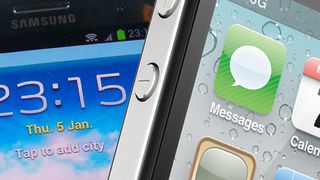Latest Apple vs Samsung dispute comes to not-so-epic conclusion
How's another $119.6 million sound?

Apple has come out a little richer from its latest courtroom cage match with rival Samsung.
A jury in San Jose, Calif. has awarded the Cupertino firm a cool $119.6 million (about £70m, AU$120m) in damages. Samsung must pay the amount for devices the jury found infringed on two Apple patents.
The jury found Samsung products to infringe on a "quick-links" patent and a "slide-to-unlock" patent, but didn't find some phones to infringe on two patents pertaining to universal search and background sync. The jury also found Samsung to have willfully infringed on a patent the judge in the case had previously determined the Korean company had violated.
Samsung isn't leaving town empty handed; the jury determined Apple violated two Samsung patents, though the non-willful infringement will only cost Apple $158,400 (about £93,900, AU$170,929).
On higher ground
The final amounts are significantly smaller than either company had come to court hoping to win, but these disputes have never really been about the dollar amounts.
In a statement to Re/code, Apple applauded the ruling.
"We are grateful to the jury and the court for their service. Today's ruling reinforces what courts around the world have already found: That Samsung willfully stole our ideas and copied our products. We are fighting to defend the hard work that goes into beloved products like the iPhone, which our employees devote their lives to designing and delivering for our customers."
Get daily insight, inspiration and deals in your inbox
Get the hottest deals available in your inbox plus news, reviews, opinion, analysis and more from the TechRadar team.
Neither Samsung or Google have issued statements. Google would have covered some damages for two patents Apple argued for, however neither were found to have been infringed.
Michelle was previously a news editor at TechRadar, leading consumer tech news and reviews. Michelle is now a Content Strategist at Facebook. A versatile, highly effective content writer and skilled editor with a keen eye for detail, Michelle is a collaborative problem solver and covered everything from smartwatches and microprocessors to VR and self-driving cars.
Most Popular

